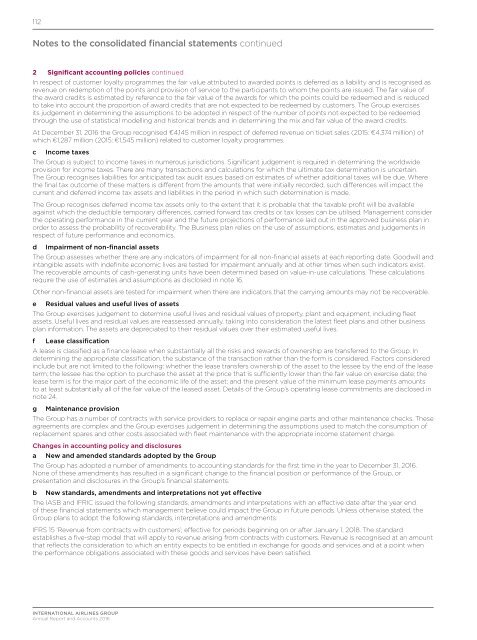Annual report and accounts 2016
Create successful ePaper yourself
Turn your PDF publications into a flip-book with our unique Google optimized e-Paper software.
112<br />
Notes to the consolidated financial statements continued<br />
2 Significant accounting policies continued<br />
In respect of customer loyalty programmes the fair value attributed to awarded points is deferred as a liability <strong>and</strong> is recognised as<br />
revenue on redemption of the points <strong>and</strong> provision of service to the participants to whom the points are issued. The fair value of<br />
the award credits is estimated by reference to the fair value of the awards for which the points could be redeemed <strong>and</strong> is reduced<br />
to take into account the proportion of award credits that are not expected to be redeemed by customers. The Group exercises<br />
its judgement in determining the assumptions to be adopted in respect of the number of points not expected to be redeemed<br />
through the use of statistical modelling <strong>and</strong> historical trends <strong>and</strong> in determining the mix <strong>and</strong> fair value of the award credits.<br />
At December 31, <strong>2016</strong> the Group recognised €4,145 million in respect of deferred revenue on ticket sales (2015: €4,374 million) of<br />
which €1,287 million (2015: €1,545 million) related to customer loyalty programmes.<br />
c Income taxes<br />
The Group is subject to income taxes in numerous jurisdictions. Significant judgement is required in determining the worldwide<br />
provision for income taxes. There are many transactions <strong>and</strong> calculations for which the ultimate tax determination is uncertain.<br />
The Group recognises liabilities for anticipated tax audit issues based on estimates of whether additional taxes will be due. Where<br />
the final tax outcome of these matters is different from the amounts that were initially recorded, such differences will impact the<br />
current <strong>and</strong> deferred income tax assets <strong>and</strong> liabilities in the period in which such determination is made.<br />
The Group recognises deferred income tax assets only to the extent that it is probable that the taxable profit will be available<br />
against which the deductible temporary differences, carried forward tax credits or tax losses can be utilised. Management consider<br />
the operating performance in the current year <strong>and</strong> the future projections of performance laid out in the approved business plan in<br />
order to assess the probability of recoverability. The Business plan relies on the use of assumptions, estimates <strong>and</strong> judgements in<br />
respect of future performance <strong>and</strong> economics.<br />
d Impairment of non-financial assets<br />
The Group assesses whether there are any indicators of impairment for all non-financial assets at each <strong>report</strong>ing date. Goodwill <strong>and</strong><br />
intangible assets with indefinite economic lives are tested for impairment annually <strong>and</strong> at other times when such indicators exist.<br />
The recoverable amounts of cash-generating units have been determined based on value-in-use calculations. These calculations<br />
require the use of estimates <strong>and</strong> assumptions as disclosed in note 16.<br />
Other non-financial assets are tested for impairment when there are indicators that the carrying amounts may not be recoverable.<br />
e Residual values <strong>and</strong> useful lives of assets<br />
The Group exercises judgement to determine useful lives <strong>and</strong> residual values of property, plant <strong>and</strong> equipment, including fleet<br />
assets. Useful lives <strong>and</strong> residual values are reassessed annually, taking into consideration the latest fleet plans <strong>and</strong> other business<br />
plan information. The assets are depreciated to their residual values over their estimated useful lives.<br />
f Lease classification<br />
A lease is classified as a finance lease when substantially all the risks <strong>and</strong> rewards of ownership are transferred to the Group. In<br />
determining the appropriate classification, the substance of the transaction rather than the form is considered. Factors considered<br />
include but are not limited to the following: whether the lease transfers ownership of the asset to the lessee by the end of the lease<br />
term; the lessee has the option to purchase the asset at the price that is sufficiently lower than the fair value on exercise date; the<br />
lease term is for the major part of the economic life of the asset; <strong>and</strong> the present value of the minimum lease payments amounts<br />
to at least substantially all of the fair value of the leased asset. Details of the Group’s operating lease commitments are disclosed in<br />
note 24.<br />
g Maintenance provision<br />
The Group has a number of contracts with service providers to replace or repair engine parts <strong>and</strong> other maintenance checks. These<br />
agreements are complex <strong>and</strong> the Group exercises judgement in determining the assumptions used to match the consumption of<br />
replacement spares <strong>and</strong> other costs associated with fleet maintenance with the appropriate income statement charge.<br />
Changes in accounting policy <strong>and</strong> disclosures<br />
a New <strong>and</strong> amended st<strong>and</strong>ards adopted by the Group<br />
The Group has adopted a number of amendments to accounting st<strong>and</strong>ards for the first time in the year to December 31, <strong>2016</strong>.<br />
None of these amendments has resulted in a significant change to the financial position or performance of the Group, or<br />
presentation <strong>and</strong> disclosures in the Group’s financial statements.<br />
b New st<strong>and</strong>ards, amendments <strong>and</strong> interpretations not yet effective<br />
The IASB <strong>and</strong> IFRIC issued the following st<strong>and</strong>ards, amendments <strong>and</strong> interpretations with an effective date after the year end<br />
of these financial statements which management believe could impact the Group in future periods. Unless otherwise stated, the<br />
Group plans to adopt the following st<strong>and</strong>ards, interpretations <strong>and</strong> amendments:<br />
IFRS 15 ‘Revenue from contracts with customers’; effective for periods beginning on or after January 1, 2018. The st<strong>and</strong>ard<br />
establishes a five-step model that will apply to revenue arising from contracts with customers. Revenue is recognised at an amount<br />
that reflects the consideration to which an entity expects to be entitled in exchange for goods <strong>and</strong> services <strong>and</strong> at a point when<br />
the performance obligations associated with these goods <strong>and</strong> services have been satisfied.<br />
INTERNATIONAL AIRLINES GROUP<br />
<strong>Annual</strong> Report <strong>and</strong> Accounts <strong>2016</strong>



